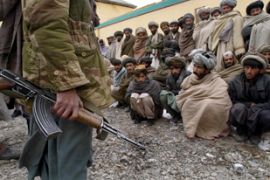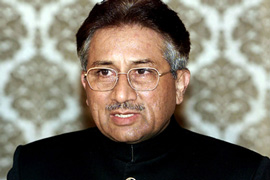Pakistan’s Taliban pact criticised
Think-tank says “Islamabad’s tactics have only emboldened the pro-Taliban militants”.

“Islamabad’s tactics have only emboldened the pro-Taliban militants,” Ahmed said.
The government, which made deals with pro-Taliban groups in 2004 and 2006 in South and North Waziristan respectively, has released militants, returned their weapons and agreed to let foreign terrorists stay on a promise to give up violence, the report says.
The ICG states that this has simply given pro-Taliban elements licence to recruit and arm, resulting in a serious increase in cross-border attacks against US, Nato and Afghan forces.
Tribal agents
Pakistan‘s seven tribal agencies have never been brought under the writ of any government, including British colonialists who saw the mountainous region as a buffer on the northwestern border of their Indian empire.
|
“Pro-Taliban elements now have a free hand to recruit, train and arm” International Crisis Group |
The region, which was a base for US- and Pakistan-backed Afghan mujahidin fighters in the 1980s, became a refuge for Taliban and al-Qaeda after US-led forces ousted Afghanistan’s Taliban rulers in 2001.
According to ICG, Pakistan, a major US ally in the war on terror, launched “badly planned and poorly conducted” military operations in 2004 to deny al-Qaeda fighters sanctuary and stem attacks into Afghanistan.
After clashes in which hundreds of Pakistani troops were killed, Pakistani authorities forged pacts aimed at ending attacks on Pakistani forces and raids into Afghanistan.
The pacts, however, served only to strengthen tribal fighters, and “pro-Taliban elements now have a free hand to recruit, train and arm,” said the report.
“The militants now hold sway in South and North Waziristan Agencies and have begun to expand their influence not just in other tribal agencies such as Khyber and Bajaur but also in NWFP’s settled districts,” it said, referring to North West Frontier Province.
A lack of control
The seven tribal districts, known as the Federally Administered Tribal Areas (FATA), are ruled by repressive colonial-era administrative and judicial systems inherited from Britain, the think-tank said.
 |
| The ICG says the US and EU must tie their support for Musharraf to political reform |
“The state’s failure to extend its control over and provide good governance to its citizens in FATA is equally responsible for empowering the radicals.”
The area has to be integrated into Pakistan’s system of provincial governments and its inhabitants given political rights. Broad-based development also has to be generated, the ICG report says.
The Pakistan government has defended the pacts saying they were struck with tribal elders and are aimed at reinvigorating tribal power structures and isolating the tribal fighters.
Pervez Musharraf, the Pakistani president, has spoken about the need for reform in the tribal areas and the need to promote development.
Recommendation
ICG further stated that the US and EU need to tie economic and diplomatic support to Musharraf to reform and free, democratic elections in 2007.
“The US and Europe need to realise that democratic, civilian government, not military rule, is their best and natural ally against extremism and terrorism”, Robert Templer, ICG’s Asia director, said.
Ahmed said: “These border areas are still run under colonial-era laws that make their people second-class citizens in Pakistan. Unless the government institutes real democratic change, extremism and terrorism will quickly overtake the entire region”.